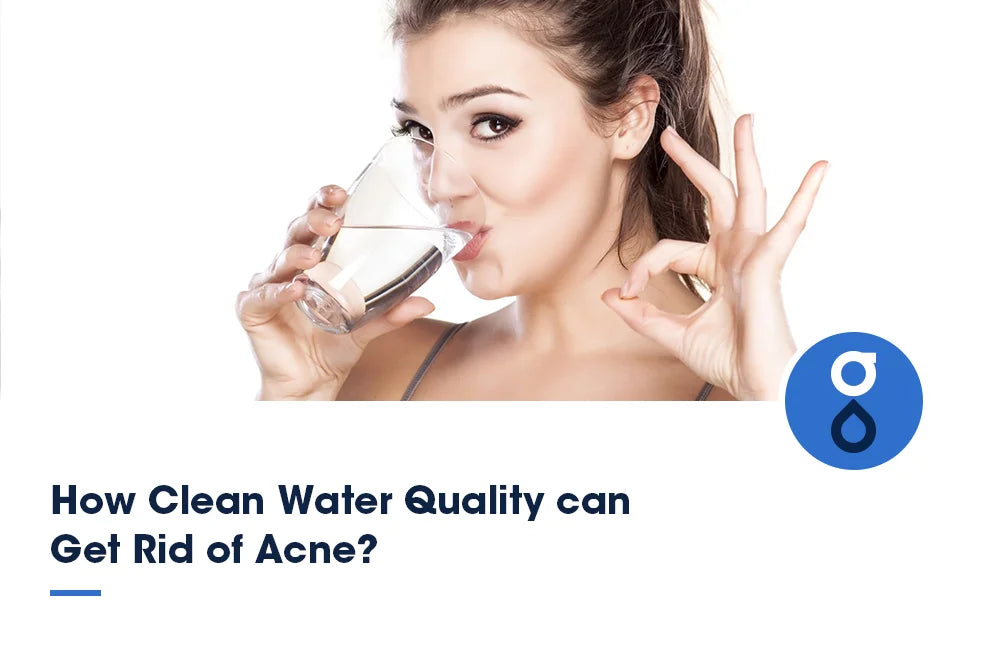Table of Contents:
Understanding acne: causes and contributing factors
The impact of water quality on skin health
How clean water can help prevent and treat acne?
The best types of water for clear skin
Tips for using clean water to combat acne
Conclusion
Acne is one of the most common skin conditions, affecting millions worldwide. Whether it's a stubborn pimple, a breakout of blackheads, or cystic acne, we all know how frustrating it can be to deal with acne. While genetics, hormones, and lifestyle factors all play significant roles in the development of acne, one often overlooked factor is the quality of the water we drink and use on our skin. This blog will explore how clean water quality can help prevent and treat acne, giving you a clearer and healthier complexion.
Understanding acne: causes and contributing factors

Before diving into the connection between water and acne, it’s important to understand what acne is and what causes it.
What is acne?
Acne is a skin condition when hair follicles become clogged with oil, dead skin cells, and sometimes bacteria. This leads to pimples, blackheads, whiteheads, or more severe cysts and nodules. Acne typically appears on the face but can also affect the back, chest, and shoulders.
Common causes of acne
- Hormonal imbalance: Fluctuating hormone levels, especially during puberty, menstruation, pregnancy, or while using birth control, can increase oil production in the skin, leading to clogged pores and acne.
- Diet: Certain foods, such as dairy, refined sugars, and greasy foods, may trigger acne in some people.
- Stress: High-stress levels can lead to the release of cortisol, a hormone that triggers oil production in the skin.
- Genetics: Family history can play a role in acne susceptibility.
- Environmental factors: Exposure to pollution, excessive sweating, and even poor water quality can contribute to acne.
The role of skin health
Healthy skin relies on a delicate balance. When the skin's natural oils mix with dead skin cells and bacteria, it can clog pores and create acne. Therefore, maintaining clear skin goes beyond just topical treatments — it's about taking care of the skin from the inside out.
The impact of water quality on skin health

Water quality plays a vital role in your overall health, including the health of your skin. Many people don’t realize that the water we drink and use to cleanse our faces can benefit or harm our skin.
How does water affect the skin?
Water is essential for hydration, which helps maintain skin moisture, elasticity, and a youthful appearance. Proper hydration supports the skin's natural barrier function, allowing it to retain moisture and keep out irritants.
Additionally, water helps flush toxins out of your body, contributing to clearer skin. By staying hydrated, you’re supporting your body’s natural detox process, helping to prevent acne from forming.
The link between water quality and skin issues
Not all water is created equal. Water quality can vary greatly depending on where you live. Contaminants, such as chlorine, fluoride, hard minerals, and other impurities, can irritate the skin and worsen acne.
- Hard water: Hard water contains high levels of calcium and magnesium, which can leave a residue on your skin, clog pores, and cause acne. The mineral buildup can also dry out the skin, leading to irritation and breakouts.
- Chlorine and fluoride: Commonly found in tap water, chlorine and fluoride can strip the skin of its natural oils, leading to dryness and irritation. These chemicals can also disrupt the skin’s pH balance, causing inflammation and acne.
How clean water can help prevent and treat acne?
Hydration and detoxification
Staying hydrated is one of the easiest and most effective ways to maintain clear skin. Proper hydration supports the skin’s ability to eliminate toxins, which can otherwise contribute to breakouts. Drinking plenty of clean, purified water ensures that your skin stays moisturized and that your body is detoxifying naturally.
Clean water for reducing skin irritation
Free water from harsh chemicals and minerals will keep your skin soft and hydrated. Hard water, conversely, can lead to dryness, tightness, and irritation, all of which can worsen acne. Clean water helps balance the skin’s moisture levels and prevents the irritation that can lead to acne flare-ups.
The role of purified water in skin pH balance
The skin's natural pH level, typically between 4.5 and 5.5, helps protect it from harmful bacteria and pollutants. Chlorine and other contaminants in tap water can alter this pH balance, potentially causing inflammation and acne. Clean water maintains the skin’s natural pH, promoting a healthy barrier and reducing the likelihood of breakouts.
Reducing exposure to harmful chemicals
Using water free from chlorine, fluoride, and other chemicals helps keep your skin safe from the harmful effects of these substances. Clean water ensures that your skin isn’t exposed to irritants that could cause acne, redness, or other skin issues.
The best types of water for clear skin
Not all water is created equal, and some types of water are better for your skin than others.
Filtered water
Water filters, such as reverse osmosis system or activated carbon filters, are highly effective at removing impurities, including chlorine, fluoride, and heavy metals. By using filtered water for drinking and washing your face, you’re minimizing the risk of acne and supporting overall skin health.
Alkaline water
Alkaline water has a higher pH than regular water and may help neutralize the acidity in your body and on your skin. This can help balance the skin’s natural pH and promote clearer skin by preventing inflammation and breakouts.
Mineral water
Mineral water, which contains beneficial minerals like magnesium and calcium, can hydrate and nourish the skin. These minerals support skin elasticity and moisture retention, helping to reduce the appearance of acne.
Tips for using clean water to combat acne
Here are some simple yet effective ways to use clean water in your daily routine to help manage and prevent acne:
-
Drink enough water
Aim to drink at least eight glasses (about 2 liters) of clean water each day to keep your skin hydrated and flush out toxins. -
Use clean water for cleansing
Always wash your face with purified or filtered water to prevent irritation and breakouts. -
Avoid hot water
Hot water can strip your skin of its natural oils, leading to dryness and irritation. Use lukewarm or cool water to cleanse your skin. -
Use a water filtration system
Invest in a high-quality water filtration system for drinking and washing your face to ensure your skin is exposed to the cleanest water possible. -
Take regular showers with clean water
Showers with hard water can contribute to body acne, especially on the back and chest. Use a water softener or shower filter to improve water quality and prevent breakouts.
Conclusion
Clean water is a simple yet powerful ally in the battle against acne. By ensuring that you drink enough purified water, wash your face with clean water, and reduce exposure to harsh chemicals, you can improve your skin’s health and reduce the frequency and severity of acne breakouts. Remember, clear skin starts from the inside out, and staying hydrated with clean, pure water is a key step in achieving that glowing, blemish-free complexion.
Take the first step today by upgrading your water with Glacier Fresh and watching your skin transform!

















